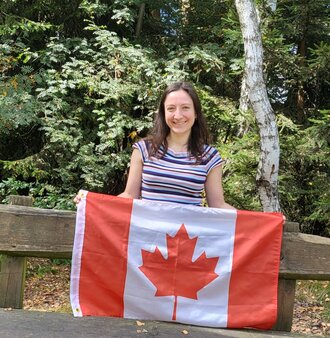
Sonja Müller spent a semester researching at a university in British Columbia. Picture: private
International opportunities for students and academics at Furtwangen University
Research connects scientists around the world. Furtwangen University also attaches great importance to international networking in research. In addition to participating in international conferences and workshops, which enable the exchange of ideas and results with experts from different countries, the university also participates in international research projects. These are supported by EU funding programmes such as Horizon Europe as well as bilateral agreements with global research institutions and companies.
HFU also offers various opportunities for individual members of the university community. For example, for students who can work on final theses in research abroad as part of an Erasmus stay. In addition, the university also offers numerous partnerships with international universities and research institutes, which give students and academics the opportunity to take their research global. Other important components of the international research strategy are internships, research stays abroad for students and doctoral candidates and the opportunity to study bilingually.
In addition, there are programmes in which international guest researchers and lecturers come to HFU to work together on specific research questions.
These international collaborations not only help to expand the academic network, but also to increase the quality and relevance of research through interdisciplinary exchange.
A current example of international research at HFU is Sonja Müller, a doctoral student at the Institute of Microsystems Engineering in Furtwangen, who worked at the University of British Columbia in Canada for six months as part of her doctorate. “Due to the expertise and laboratory equipment available, the choice was not difficult. The conditions on site were excellent and I was able to exchange ideas intensively over a longer period of time with doctoral students in the same field of research, from whom I had previously only read individual publications. The research groups were already intertwined in terms of content,” says Müller. Her stay abroad was financed by the DAAD scholarship for doctoral students.
There are funding opportunities for academic support that start as early as the bachelor's degree and extend to financial support programmes for international exchanges of professors.
In Canada, Sonja Müller worked on piezoelectric sensors and actuators − she also dedicated her doctoral thesis to this topic. In addition she worked on flexible sensor technology for clothing or in building materials in order to be able to precisely determine loads and enable possible optimisations. During her stay abroad, the support from supervisors was also well organised. “I kept in touch with my doctoral supervisor in Furtwangen and talked to him about my progress, as well as with my supervisor on site. This gave me additional ideas and broadened my view of my own research area.”
In addition to the scientific exchange, the cultural aspect was also exciting. Sonja Müller recalls her first impressions with a laugh: “In my first week, I saw parents skating on the lake with baby prams − that's when I knew I had really arrived in Canada.” Even though the Black Forest is known for outdoor activities, she was surprised by how much Canadians enjoy their free time in nature. “There was even a ski lift called 'Black Forest' in the local Big White ski resort − which naturally led to lots of questions and a long discussion about cuckoo clocks,” says Müller.